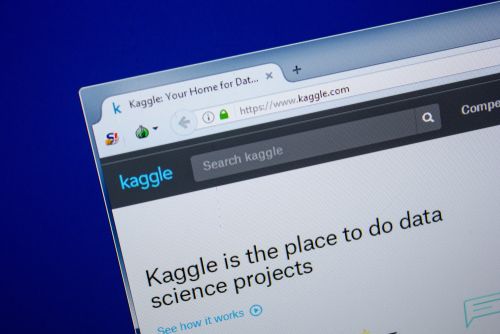![]()
What is Kaggle?
Kaggle is an online community platform for data scientists and machine learning enthusiasts. Kaggle allows users to collaborate with other users, find and publish datasets, use GPU integrated notebooks, and compete with other data scientists to solve data science challenges. The aim of this online platform (founded in 2010 by Anthony Goldbloom and Jeremy Howard and acquired by Google in 2017) is to help professionals and learners reach their goals in their data science journey with the powerful tools and resources it provides. As of today (2021), there are over 8 million registered users on Kaggle.
One of the sub-platforms that made Kaggle such a popular resource is their competitions. In a similar way that HackerRank plays that role for software developers and computer engineers, “Kaggle Competitions” has significant importance for data scientists; you can learn more about them in our Kaggle Competiton Guide and learn how to analyze a dataset step-by-step in our Kaggle Competition Tutorial. In data science competitions like Kaggle’s or DataCamp’s, companies and organizations share a big amount of challenging data science tasks with generous rewards in which data scientists, from beginners to experienced, compete on their completion. Kaggle also provides the Kaggle Notebook, which, just like DataLab, allows you to edit and run your code for data science tasks on your browser, so your local computer doesn't have to do all the heavy lifting and you don't need to set up a new development environment on your own.
Kaggle provides powerful resources on cloud and allows you to use a maximum of 30 hours of GPU and 20 hours of TPU per week. You can upload your datasets to Kaggle and download others' datasets as well. Additionally, you can check other people's datasets and notebooks and start discussion topics on them. All your activity is scored on the platform and your score increases as you help others and share useful information. Once you start earning points, you will be placed on a live leaderboard of 8 million Kaggle users.
Kaggle is suitable for different groups of people, from students interested in data science and artificial intelligence to the most experienced data scientists in the world. If you are a beginner, you can take advantage of the courses provided by Kaggle. By joining this platform, you will be able to progress in a community of people of various levels of expertise, and you will have the chance to communicate with many highly experienced data scientists. As you earn Kaggle points and medals, which are proof of your progress, it is quite possible that you may even end up attracting headhunters and recruiters, and unlock new job opportunities.
Last but not least, when applying for jobs in data science, mentioning your Kaggle experience definitely makes a positive impact. It goes without saying that all these benefits also apply to highly experienced data scientists. No matter how experienced you are, this platform offers continuous learning and improvement possibilities, and, of course, the cash rewards that can come with the competitions are just as interesting.
Helpful Data Science Courses for Kaggle Success
Here are some of the recommended courses on DataCamp for beginners:
- Winning a Kaggle Competition in Python: Develop the approaches you will apply and the strategies you will determine in Kaggle competitions
- Introduction to Python: Learn the basics of the most popular language in data science
- Intermediate Python: This is another course about basic Python knowledge
- Linear Classifiers in Python: Learn logistic regression and support vector machines and develop your first models using Scikit-learn
- Cluster Analysis in Python: Unsupervised learning using the SciPy library
- Preprocessing for Machine Learning in Python: Prepare your data for machine learning models
- Model Validation in Python: Learn to answer the question, “how good is your model?”
- Dimensionality Reduction in Python: The foundation of data visualization
- Designing Machine Learning Workflows in Python: Take a high-level look at the process for producing production-ready machine learning models
- Data Privacy and Anonymization in Python: A must-have course about the privacy of the company you work for, or for any startup you may establish
- Introduction to Data Visualization with Seaborn: Develop your data visualization skills using the Seaborn python library—an ideal course for data visualization beginners
- Image Processing in Python: In this course, you can learn image preprocessing techniques that will enable you to access and extract the vast amount of information carried in images.
- Introduction to Natural Language Processing in Python: Learn the basics of natural language processing and the use of some popular libraries in this field
- Introduction to SQL: Learn basic SQL for working with databases
- Intermediate SQL: Improve your SQL skills
- Introduction to Deep Learning with PyTorch: An introduction to deep learning using the most popular and easy-to-use Python’s Pytorch package
- Time Series Analysis in Python: Learn about time series models and techniques
Kaggle Jobs
“Kaggle Jobs” was a data science job-sharing platform opened by Kaggle in 2014. The objective of the platform was to help companies find the most suitable candidates and to help data scientists find the right companies for them. The platform was closed by Kaggle in 2020 due to insufficient activity. However, here are some Kaggle Jobs alternatives and other employment platforms:
- Linkedin: One of the most commonly used platforms for job searching. You will find suitable job offers just by writing "data scientist" in the search bar. You can specify more detailed filters as well, like remote/office, location, company size, etc.
- Upwork: Upwork is a freelance job platform that is also ideal for finding both part-time and full-time jobs. Before applying for long-term jobs, candidates generally need to have completed a few short-term jobs and received some reviews.
- AngelList: An ideal platform for startups to apply for job postings.
- Y Combinator: This is an accelerator and funding platform from where the most prestigious startups are selected. Job postings of these startups are shared on the platform.
- StackOverflow: This is a Q&A platform for programmers and engineers that we all benefit from, from young to old, and experienced to inexperienced. It also has a job posting area.
KAGGLE FREQUENTLY ASKED QUESTIONS (FAQS)
What is Kaggle and what is it used for?
Kaggle is a data science and artificial intelligence platform. On this platform, contests with monetary prizes are published by large companies and organizations. In addition to the competitions, users can also share their datasets and examine the datasets shared by others. Moreover, data scientists can share code snippets using these datasets and talk to other data scientists about them in the discussion section. Any user can benefit from participating in the free courses shared on Kaggle and they receive a free certificate after completing them successfully.
Is Kaggle free?
Yes, everything on Kaggle is completely free: courses, certificates obtained from courses, datasets, participation in competitions, discussion sections, etc.
What are Kaggle competitions?
Kaggle competitions consist of data science tasks. Some competitions do not have any prizes (but offer learning and knowledge sharing opportunities), while others have generous cash prizes. You can participate in these competitions on your own or with a team. In addition to the prize money for good scores in the competitions, you win medals and points. These points and medals put you on a leaderboard along with other data scientists of all levels on the platform. This ranking determines your global ranking in Kaggle. The competitions you win on Kaggle and your Kaggle ranking can have an advantageous impact on your career. For more information about the competitions, visit section 4.
Is Kaggle a good way to learn data science?
There are many alternatives for learning the basics and introducing yourself to data science, but there are several reasons why Kaggle stands out so well. There are many factors that will help you increase your knowledge and maintain your motivation on Kaggle.
The main one is Kaggle's ranking system. As you develop, score in competitions, and provide useful information for others, your worldwide Kaggle ranking increases, and you can follow it instantly. The fact that you are placed among many expert data scientists on the platform is very motivational.
Additionally, many people on the platform are helpful and continue to earn points and increase their rankings as they help you. For example, if you share a piece of code and a discussion about it, when you ask a question in the discussion about how you can develop your own code, it is very likely that you will receive comments from the best data scientists on the platform. This works as a mentoring system that proves to be very useful, especially for beginners.
Who owns Kaggle?
Kaggle was founded in 2010 by Anthony Goldbloom and Ben Hamner. On 8 March 2017, Google acquired Kaggle.
Are Kaggle datasets free?
To find out for what purposes you can use the datasets, you need to check the datasets’ license. Some datasets cannot be used in academic publications or for commercial purposes. However, you can download each shared dataset free of charge to your Kaggle Notebook or anywhere else via the Kaggle API.
Does Kaggle provide GPU?
In Kaggle notebooks, you can activate a GPU at any time. You are allowed to use the GPU actively for a maximum of 30 hours per week. The GPU provided by Kaggle is Nvidia Tesla P100 GPU with 16GB memory.
Who is Jeremy Howard?
Jeremy Howard is an Australian data scientist and entrepreneur who won the global Kaggle data science competitions in 2011 and 2010. Howard then became Chief Scientist and President at Kaggle.
What is a Kaggle Grandmaster?
The grandmaster tier is the highest among the Kaggle performance tiers (novice, contributor, expert, master, and grandmaster). In order to reach the grandmaster level, a user needs to win at least 5 gold medals in competitions, out of which at least 1 needs to be a solo gold medal; at least 5 gold and 5 silver medals in datasets; at least 15 gold medals in notebooks; and at least 500 medals in discussions, out of which at least 50 need to be gold medals. There are currently only 241 data scientists in the grandmaster tier.
Are Kaggle datasets open-sourced?
Yes. Kaggle datasets are open-sourced, but to find out for what purposes these datasets can be used, you need to check the datasets' license. Some datasets cannot be used in academic publications or for commercial purposes.
Are Kaggle datasets reliable?
The vast majority of Kaggle datasets are reliable. You can judge how reliable a dataset is by looking at its upvotes or by reviewing the notebooks shared using the dataset. However, not all Kaggle datasets will work for real-life use cases.
Does Kaggle have a mobile app?
Kaggle does not currently support a mobile app. However, DataCamp does have a mobile app to learn data science and practice coding. It is available for iOS and Android.
Does Kaggle use my CPU?
Kaggle Kernel is a free Jupyter notebook server that can integrate GPU. It allows you to process machine learning operations on cloud computers instead of doing it on your own computer, in a similar way to DataLab that works on the browser, using cloud-based resources as opposed to your local machine.
Where is my notebook output in Kaggle?
In order to access Kaggle’s notebook outputs, you must first commit your notebook. You can do this by clicking the “Save Version” button on the top left of the notebook. After committing your notebook, two kernels will continue to work. The first one is the one that you are editing at the moment, and the second is the background kernel, which you committed. The kernel running in the background will create ready-to-download output files. Interactive notebooks will not save files. After the kernel in the background is finished, click on the back button on the top left to go to the page with the following tabs: Notebook, Code, Data, Output, and Comments. When you switch to the output tab, you will see that the output files are ready for download.
Where to start in Kaggle?
If you are a beginner, you can start by participating in the competitions in the “Getting Started” category in the competitions section. You can also review other people's notebooks. If you are at a more advanced level of expertise, you can start directly by participating in active competitions.
When does Kaggle reset the GPU quota?
The GPU quota is renewed every Saturday. You can check your remaining GPU quota in the GPU section by going to the Account tab in your profile. This section shows your private data storage, and the GPU and TPU quota.
Where to find Kaggle winning solutions?
When you click on the discussion tab from the competitions page, you will see many discussion topics about the competitions. The discussion topic with the most upvotes is at the top and the topic with the most votes is the winner, with the solution explanation and the link to the winning notebook.



